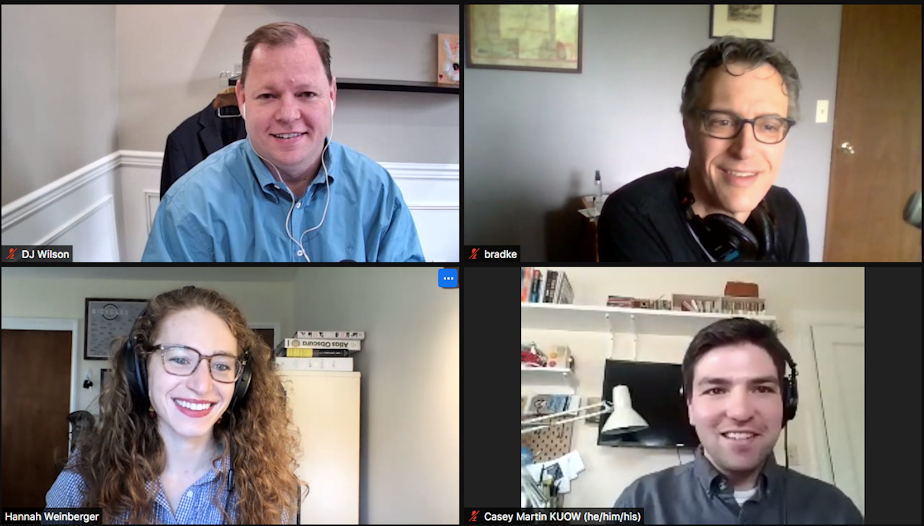This week: so many vaccines, so few arms

Bill Radke reviews the week's news with Crosscut science and environment reporter Hannah Weinberger, Washington State Wire founder and publisher DJ Wilson and KUOW reporter Casey Martin.
Seattle Mayor Jenny Durkan has an ambitious goal: to get 70% of the city’s population fully vaccinated by the end of May. Now only if the demand was there. As of Thursday afternoon, at its four city-run vaccination sites, there were more than 14,000 appointment slots available despite the city receiving its largest seven-day federal vaccine allocation to date, allowing it to administer more than 52,000 doses. Is vaccine hesitancy to blame for the unfilled appointments or could it be more due to shortcomings in planning and access, especially for BIPOC communities?
Also this week, Seattle and King County Public Health Director Patty Hayes told the King County Council that the county should be prepared to roll back from phase three to phase two next week. One reason for the surge in coronavirus infections and hospitalizations appears to be the spread of more contagious and deadly coronavirus infections, according to health officials. But will tightened restrictions on indoor gatherings under phase two make much practical difference here in King County for residents or will businesses bear the brunt of tightened restrictions? And if New York City Mayor Bill DeBlasio can triumphantly claim that New York City will fully reopen on July 1, why can’t Seattle do the same?
The Washington state legislature officially adjourned on Sunday. And, for being in the middle of a pandemic, they got a lot done this year. From legislation on climates change, to police reform, to fiscal policies, there are a lot of new bills for the governor to sign into law. One of the bills that passed is a controversial new capital gains tax which is already facing a challenge in court. The lawsuit contends that, among other things, the new bill imposes a tax on income, and violates the state constitution, which says that taxes must be applied uniformly across the same class of property.
One issue the legislature didn't find consensus on tackling is the homelessness crisis. Today, Seattle city crews started removing tents at Gilman Playfield in Ballard, following a sweep conducted two weeks ago in east Capitol Hill at Miller Playfield where dozens of people had been living in tents directly across from a middle school. Despite CDC guidance to halt encampment sweeps to stop the spread of Covid-19, why is the city ramping them back up? And how will the slate of anti-camping local ordinances passed recently in places like Everett, Auburn and Mercer Island impact Seattle's homeless population?
And with summer around the corner, people will soon be taking to the water again to kayak, paddle board or go for a brisk, chilly swim. Washington state has an agency, the Recreation and Conservation Office, that not only provides funds for outdoor recreation but also helps conserve the state's wildlife habitats. One species that is in dire need of conservation is salmon, whose numbers are not only declining but who are also returning from the Pacific Ocean to coastal waters sooner and smaller. How much can the Recreation and Conservation Office help salmon numbers rebound? And with population growth and climate change, what hope do salmon have to not only survive in a rapidly changing - and threatened - ecosystem?






